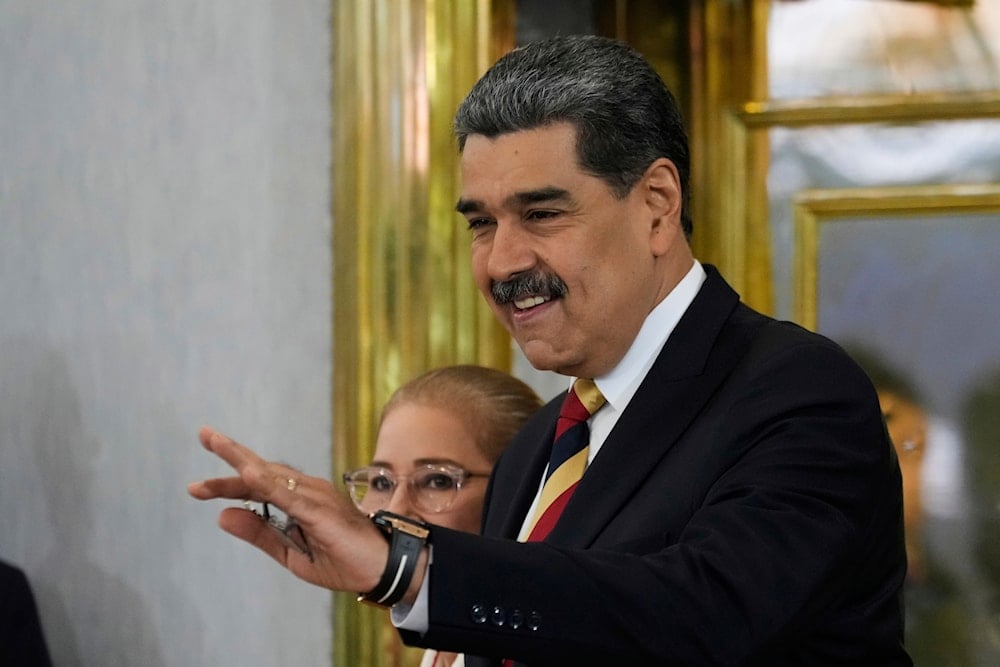Maduro vows Venezuela will resist US pressure and imperialism
Venezuelan President Nicolas Maduro denounces US interference and urges Latin American unity against imperialist agendas, vowing Venezuela will defend its sovereignty at all costs.
-

Venezuela President Nicolas Maduro arrives for a press conference in Caracas, Venezuela, Monday, September 1, 2025. (AP)
Venezuelan President Nicolas Maduro has once again vowed that his country will never yield to Western powers or become a pawn of foreign empires, reaffirming Venezuela’s defiance against what he described as ongoing imperialist ambitions.
Speaking in Caracas at the International Conference on Colonialism, Neocolonialism, and the Territorial Dispossession of the Western Empire, Maduro declared that Venezuela “will never humiliate itself before any empire, regardless of its power or name.” He added that those seeking to dominate his country “will be taught, in proper measure, a moral, ethical, and political lesson in the years to come.”
Maduro accused the United States of plotting an armed intervention to impose a “puppet government” in Caracas and seize Venezuela’s natural resources.
“The people of the United States are attentive, observant, and very aware of what is intended against Venezuela,” he said.
“It is an armed aggression to impose regime change, to impose puppet governments, and to steal the oil, gas, gold, and all the natural resources of a homeland that is forging its own path with its own model.”
US strikes another vessel off Venezuela, killing four
This comes as the United States escalated its military campaign in Latin America, carrying out yet another deadly strike on Friday off the coast of Venezuela under the false pretext of fighting narcotics trafficking.
War Secretary Pete Hegseth announced the latest strike in a post on X, celebrating the destruction of a small vessel that US officials claimed was carrying drugs. A video accompanying the post showed the boat erupting into flames, a scene observers say reveals Washington's growing reliance on extrajudicial force and its willingness to kill without evidence, trial, or accountability.
The latest strike brings the death toll to at least 21 people across four attacks in recent weeks, none of whom have been positively identified as traffickers. Washington has offered no independent proof linking the victims to drug networks, raising concerns that the US is unilaterally executing individuals in foreign waters under a fabricated pretext.
This new military doctrine stems from President Donald Trump's declaration that the United States is now in "armed conflict" with drug cartels, reclassifying them as "terrorist organizations", a move legal scholars have condemned as an attempt to bypass international law.
A Pentagon notice sent to Congress, obtained by AFP, claimed, "The president determined these cartels are non-state armed groups, designated them as terrorist organizations, and determined that their actions constitute an armed attack against the United States." The same document described alleged smugglers as "unlawful combatants", stripping them of legal protection under the Geneva Conventions.
Rights groups have warned that such terminological manipulation echoes past US practices, from the "war on terror" to the invasions of Panama and Iraq, where legal gray zones were exploited to justify preemptive violence and regime change.
Political theater and extrajudicial killings
The Trump administration has openly celebrated these operations as demonstrations of strength rather than law enforcement. Trump's communications director, Steven Cheung, declared that traffickers had been "turned into stardust." On Truth Social, Trump himself echoed the narrative, writing, "A boat loaded with enough drugs to kill 25 TO 50 THOUSAND PEOPLE was stopped, early this morning off the Coast of Venezuela, from entering American Territory."
But independent analysts and international law experts argue that the campaign bears all the hallmarks of a covert regime change operation. This is happening amid an unprecedented US military buildup near Venezuela, including the deployment of F-35 warplanes to Puerto Rico, marking the largest show of force in the Caribbean in more than three decades.
Venezuela's Defense Minister Vladimir Padrino condemned the presence of US jets near Venezuelan airspace as "a provocation" and "a threat to our national security."
Read more: Maduro vows crushing regional response to any US attack on Venezuela

 4 Min Read
4 Min Read










